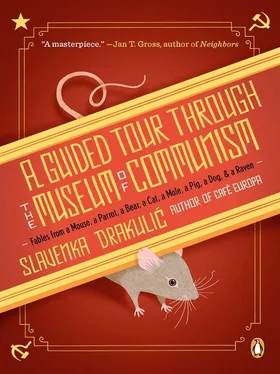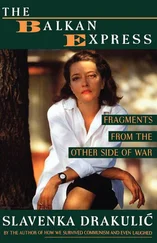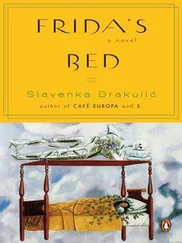Anyway, my mother just listened as he went on:
“The minister sat at his desk for a long time; I thought heʹd fallen asleep. Then he stood up and came to the window again. I clearly saw his very pale face as he pressed his forehead against the cool glass.
“What happened afterward occurred in plain view. But—how to tell you? I did and I did not see it. How can I explain it? If it hadn’t been for that shadow, whose presence was almost more real than the minister himself, I’d say I had witnessed a classic suicide. The minister first took a sheet of paper and a pen and wrote a short note—I mean, it didn’t take long, the writing. Then, as if he had an afterthought, he reached for another sheet of paper and wrote something; this time it took longer, because he paused several times. Only then did the minister take a pistol from the drawer and put it on the desk, keeping it under the palm of his hand a while, as if warming it up. As far as I could see, he did not look desperate but rather calm. But before he pulled the trigger, I realized that he saw the shadow again! It had never left his room… The minister looked at it, his eyes wide open with fear, and then quickly pulled the trigger. As his head fell forward, I saw first a fountain of blood gush out, and then crimson drops slowly slide down the wall behind him…
“And then… and then… I saw the most incredible, most horrendous thing happen. I saw it—I did!—the shadow come up to him and lean over his body, as if checking to see that he was really dead. It then switched the light off and left the room. I swear I saw the light go off.
“When I think now that I am the last being who saw him alive…”
Here Mother writes in her notes that, at this point, she suggested that he might have taken some substances and suffered from a hallucination. But my impression is that she wrote this not as a real possibility but only as part of what she thought was her carefully constructed fable. In any case, he responded to her:
“Was I imagining a shadow? Hallucinating? Seeing the effect of the lamp light that night? Yes, that is of course possible. But what confuses me is that the whole thing, the duel between that wretched man and the shadow, lasted so long. Probably a couple of hours, although it seemed to me like the whole night now. Could I have really been looking at some kind of play that nature had arranged for me? Or was it a shadow-theater performance? No, I don’t think so…
“You see, I am convinced that the shadow was… his soul. What is a shadow without a body? If it is not another shape assumed by the Devil, then it must be the soul. But the minister’s soul was a dark, menacing, evil soul. Yet, his own! This was the most tragic thing for me, to see how dark his soul was.”
I think that my mother wanted to comment on this but then gave up. There are traces left of her writing that she obviously erased. It must have been fascinating for her to hear raven (or Raven, or whoever that person was) mention both the Devil and the soul . Albania was proud of being the first atheist country in the world! No churches to pray in here; they were all turned into storehouses or assembly halls, over two thousand of them, of all denominations. It also meant that religious concepts and expressions such as the Devil and the soul were exorcised from the language. From the public language, that is. Yet it would have been highly unlikely that a person used them even privately, and in such a matter-of-fact manner, as if he really believed they existed! Well, perhaps not, if that person also was really a patient believing he was a bird, of course. But what if this person was only disguised as a patient by my mother? So he could say what he wanted, all the while being treated (in her notes) as a psychotic persona. I think that she might have herself put these religious words into Raven’s mouth, just to illustrate to the outsider (the unintended reader) how sick he was, since no person in his right mind would ever utter them.
“Now, how could I tell anyone but you what I saw—a murder committed by a soul? But you agree that what I saw could indeed have been his own dark soul that pushed him into performing such an act? Metaphorically speaking, you say… Why did I never think of that? Of course, it is possible that he fought with himself and that his own bad conscious forced him into suicide. He had a lot on his conscience; maybe that is what killed him in the end. He was his own worst enemy; every man is. But in your interpretation that would mean the man in question had a conscience, which I am not so sure about.”
This was the last she heard from Raven. He disappeared from her life as suddenly as he had entered it—however, this time not through the window. At least, she doesn’t bother to mention this detail any longer. He left a doubt behind, a hint, a seed of suspicion that, after all, it might not have been a simple suicide but rather a kind of assisted suicide—even if assisted by the mysterious shadow. Although it remains unclear what Raven meant by the shadow. Or what he really saw, for that matter.
• • •
My reading of her notes is this: Comrade Raven did not pretend to be a bird, the bearer of bad news. He did not imagine or hallucinate blood. He was a person in power who saw the suicide of the prime minister that night. But the man could not keep his secret any longer and just cracked. He perhaps really lapsed into a temporary psychosis. It probably does not happen very often in his line of work, but one cannot exclude such a possibility. And he felt a strong urge to tell what he saw, to get it out, to confide in somebody. In all probability he was unlikely to talk to a friend or his wife. Whom could he turn to, I ask you, but to a professional who would keep his secret (“how could I tell anyone but you?”)?
I can tell you that I was not only puzzled by the symbolism of the raven, or the question of Raven’s identity, but also—as I mentioned to you earlier—by the form my mother had chosen to express herself. You see, from what I read and detected, and there are many other interesting details in her notes, as you will undoubtedly discover yourself, I am convinced that Raven was not only a witness, but also the executor.
Whoever that persona was, he was sent to the minister not only to deliver the judgment of the powers that be, but to execute it as well.
My mother, once burdened by his terrible secret, confided it to her diary—but not in simple words. She chose the form of a fable. The story of a bird—very much in the tradition of folktales. I think she was careful to compose his story in a literarily convincing way. Her fear and her conscience turned her into a writer—but isn’t that often the case in many a dictatorship? Not that it helps; many writers have experienced just the opposite. Therefore, she hid it carefully.
From some of her comments (and I read you only a few) I see that she, too, suspected that Raven himself had been present in the room both before and during the suicide. Her suspicion—or, better said, her intuition—was that he was there in order to actually explain to the minister that suicide would be the only honorable way out of the impossible situation he had put himself in. Should the minister have had any doubts, that is. Maybe he did not have any doubts; yet Raven spoke about a battle of some kind. Could the two of them have been arguing? After all, according to the notes it seems that their conversation lasted quite a while.
In the end, the one who dispatched him had to be sure of the result, it seems, so the shadow persona waited until the “self-execution” (Mother uses that expression in one place) was over and checked that the minister was dead. Like a real professional. If we are to take the whole fable seriously, which she obviously did.
Читать дальше












